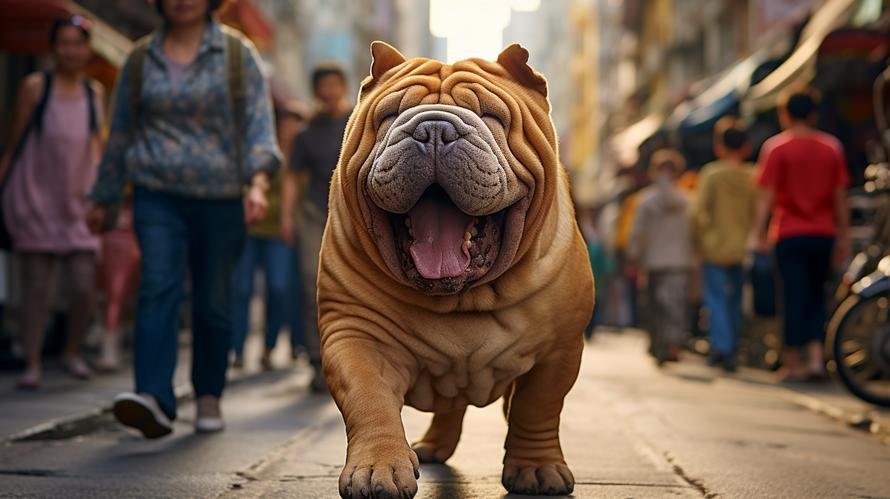As humans, we’re fascinated by revealing truths hidden to our own eyes. In the world of dog breeds, such revelations provide one instance of this allure. You may have seen, or even have, a Shar-Pei — a breed of dogs originating from China, known for its deep-set wrinkles and a bluish-black tongue. The breed, unfortunately, is often feared because of its reputation for potential aggression. But is this reputation true or is it a symptom of a bigger problem? Is the Shar-Pei indeed a dangerous dog breed?
The Shar-Pei, like a celebrity hounded by paparazzi, are victims of bad press. The media often portrays them as unruly and aggressive, but in reality, a Shar-Pei’s temperament can be as calm as a serene lake or as wild as a roaring waterfall — much of it depends on how they are raised and trained.
The genesis of this breed provides the first key to deciphering this mystery. History reveals that the Shar-Pei were initially bred for farming tasks such as herding livestock and guarding properties. They are known for their undying loyalty, a trait that made them useful in these roles. This characteristic has often been misconstrued as aggression, an unfortunate stereotype that has contributed to their tarnished image.
However, a little digging unveils an opposite trend. The American Temperament Test Society’s data chronicles a pass rate of 84.1% for the breed, putting them ahead of Golden Retrievers, a breed celebrated for their sweet nature. This disparity compels us to reconsider the ‘dangerous’ label pinned onto Shar-Pei, as they score higher on the behavior test than some loved breeds.
Nevertheless, there are certain aggressive tendencies that Shar-Peis might display. One of these is their territorial attitude. They are protective by nature, and they can act hostile if they presume their family is under threat. Exposing a young Shar-Pei to various social situations will significantly help temper this instinct.
Dogs are individuals, just like humans, and no single dog typifies the perfect representation of its breed. Generic labels confine our understanding of a dog’s true potential and personality. However, this doesn’t mean that Shar-Peis are automatically suitable for all types of families. They can be robust and stubborn, which can make them hard to train. They operate best under a strong leader with experience in handling dominant dogs.
Understanding a dog breed’s needs is the first step towards forming a healthy bond between human and canine, and Shar-Peis are no different. They require moderate exercise to maintain their health — both physical and psychological. Walking them regularly will not only help keep them fit, but it will provide an excellent opportunity for them to socialize with others. Mental stimulation is equally crucial. Toys, tricks, or puzzles tend to keep them happy and curtail any destructive tendencies.
Nutrition plays a significant role as well. A well-fed Shar-Pei is a happy Shar-Pei. They can be prone to certain health issues, like allergies and skin infections, given their characteristic deep wrinkles. A diet rich in essential nutrients will help combat these disorders while maintaining their distinguishing coat’s health.
Investing in a professional trainer, who focuses on positive reinforcement techniques, is also an excellent option. The trainer can nurture the Shar-Pei’s guarding instincts, molding them to be protective but not aggressive.
Another strategy is adopting from a reputable breeder who has prioritized temperament in their selection process. The breeder should be forthcoming about the breed’s potential health and behavioral challenges and also about the parents’ personalities, which contribute significantly to the puppies’ traits.
Countless people, trained to fear Shar-Peis, have changed their minds once they encountered one. These dogs often turn out to be loving, amusing, and curious, breaking the mold we often place them in. We must do our part to give them a fair shake.
In conclusion, labeling Shar-Pei as dangerous overgeneralizes and oversimplifies the reality. Every Shar-Pei, like any other dog breed, reciprocates the love, care, and discipline given to them with loyalty and devotion. Every dog is a product of its upbringing, and with the right guidance, a Shar-Pei is as safe and friendly as any other dog. It’s up to us to uncover this breed’s concealed beauty and generosity, helping to reform its public image one adorable, wrinkly-faced individual at a time.



